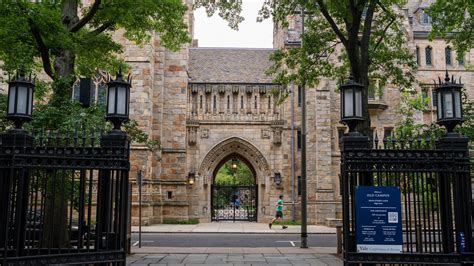Yale University has been accused of having grade inflation, a phenomenon in which the average grades awarded to students have been increasing over time. This has led to concerns that students are not being adequately challenged and that the value of a Yale degree is being diminished.

Evidence of Grade Inflation at Yale
There is some evidence to support the claim that Yale has grade inflation. For example, a 2016 study by the National Bureau of Economic Research found that the average GPA at Yale had increased by 0.3 points per decade since 1960. This increase is significantly higher than the national average, which has only increased by 0.1 points per decade.
In addition, a 2017 study by the College Board found that Yale students were more likely to receive A grades than students at other elite universities. For example, 44% of Yale students received A grades in 2017, compared to 37% of students at Harvard University and 35% of students at Stanford University.
Causes of Grade Inflation at Yale
There are a number of factors that may have contributed to grade inflation at Yale. One factor is the increasing pressure on students to succeed. With the cost of college rising and the job market becoming increasingly competitive, students are feeling more pressure to get good grades in order to get into a good graduate school or land a good job.
Another factor that may have contributed to grade inflation is the changing nature of the student body. Yale is now admitting more students from backgrounds that are underrepresented in higher education. These students may be less prepared for the rigors of Yale’s academic program, which may lead to professors giving them higher grades in order to help them succeed.
Consequences of Grade Inflation at Yale
Grade inflation can have a number of negative consequences. One consequence is that it can make it more difficult for students to distinguish themselves from their peers. When everyone is getting good grades, it becomes more difficult for employers and graduate schools to identify the students who are truly the most qualified.
Another consequence of grade inflation is that it can lead to a decline in the quality of education. When professors are giving students higher grades in order to make them happy, they may be less likely to challenge them academically. This can lead to students learning less and developing fewer critical thinking skills.
Addressing Grade Inflation at Yale
Yale University has taken steps to address grade inflation. In 2016, the university implemented a new grading policy that made it more difficult for students to receive A grades. The university has also increased the number of courses that are taught by graduate students, who are typically more rigorous in their grading than professors.
It is too early to say whether these measures will be effective in reducing grade inflation at Yale. However, they are a step in the right direction.
Conclusion
The evidence suggests that Yale University does have grade inflation. This is a concern because it can make it more difficult for students to distinguish themselves from their peers and it can lead to a decline in the quality of education. Yale University has taken steps to address grade inflation, but it is too early to say whether these measures will be effective.
